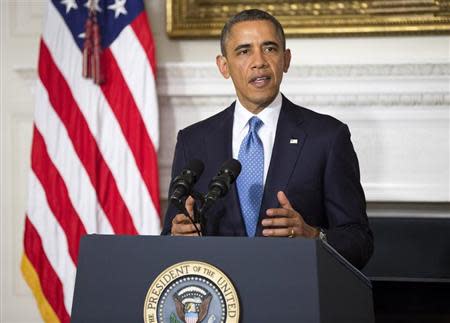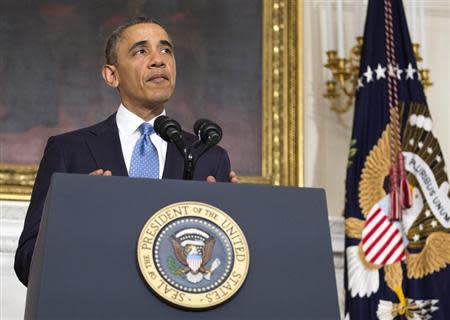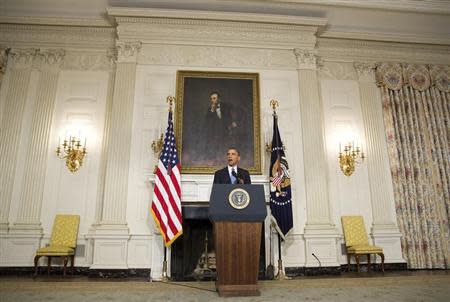Obama has leeway on Iran, despite U.S. lawmakers' concerns
By Patricia Zengerle and Caren Bohan WASHINGTON (Reuters) - Republican and Democratic U.S. senators on Sunday voiced skepticism about a nuclear deal reached with Iran but Congress looked likely to give President Barack Obama room to see if the agreement works. The deal does not need to be ratified by Congress and Obama is using his executive power to temporarily suspend some existing U.S. sanctions on Iran. On Sunday, influential Democrats - who control the Senate - made clear that any new sanctions against Iran would include a six-month window before they took effect. That would allow time to see if Iran is sticking by the pact, worked out between Tehran, the United States and other world powers. "It is a choice between a pause or imminent war. I choose a verifiable pause," said Senator Bill Nelson, a Florida Democrat. Senators have been discussing for months imposing even tighter Iran sanctions, which could anger Tehran and put Sunday's interim deal reached in Geneva in jeopardy. But they held off after the Obama administration asked for time to let negotiators reach a deal. And pro-Israel lobbying organizations - among the most effective interest groups in Washington - have failed so far to persuade lawmakers to tighten the sanctions screw on Iran. Democratic Senator Robert Menendez, who is known as a hawk on Iran, said forthcoming legislation would "provide for a six-month window to reach a final agreement before imposing new sanctions on Iran." That gives supporters of the pact some breathing space but allows Obama to have a series of new sanctions approved by lawmakers in the coming weeks and ready to impose on Iran if need be. The Senate is likely to meet in December to debate tighter sanctions, but any bill would be written to ensure that the new restrictions are not imposed unless Iran goes back on the deal. Menendez, who is chairman of the Senate Foreign Relations Committee and sits on the Senate Banking Committee, said the legislation would make clear that the sanctions could kick in if talks toward a longer-term agreement falter or if Iran fails to live up to the interim agreement. The nuclear pact reached after marathon talks in Switzerland curbs the Iranian nuclear program in exchange for initial sanctions relief. Iran could access $1.5 billion from trade in gold and precious metals and could see the suspension of some sanctions on its automotive industry and a revival in its petrochemical exports. Washington has had sanctions against Iran for most of the past 30 years. They were ramped up sharply in 2010-11 amid increasing tensions over Iran's nuclear program, with tighter restrictions on companies that provide Iran with equipment for its oil and chemical industry and on groups that do business with financial institutions in Iran. Iran came to the negotiating table seeking relief from the tough sanctions, which are hobbling its oil-based economy. CONGRESSIONAL HAWKS Members of Congress tend to be more hawkish about Iran than the Obama administration. Legislation condemning Iran, supporting Israel and proposing stiff sanctions generally passes with strong support among both Democrats and Republicans. But a few lawmakers believed the Israeli lobbying push to halt the emerging Iran deal may have gone too far this time. A person who attended a briefing last week for members of the House of Representatives by Israel's ambassador, Ron Dermer, said some members showed concern at the "vocal and public" way Israel had lobbied the American public and Congress. Another person who has attended White House meetings on the issue said administration officials were furious. "Trying to get the Senate to do something that would thwart a major initiative of the administration - that's crossing a line," according to the source, who requested anonymity. On Sunday, even some of Obama's fellow Democrats were strongly critical of the pact. "A fairer agreement would have coupled a reduction in sanctions with a proportionate reduction in Iranian nuclear capability," said Senator Charles Schumer, the No. 3 Democrat in the Senate and a Banking Committee member. While expressing similar concerns, several Republicans appeared willing to allow time to judge deal's effectiveness. Speaking on ABC's "This Week," Republican Saxby Chambliss, vice chairman of the Senate Select Committee on Intelligence, said he believed a strong movement would build in the Senate for tighter sanctions. But Chambliss said any bill would likely include a "time frame" before the actions would take effect. Senator Bob Corker, appearing on "Fox News Sunday," pledged to hold the Obama administration's "feet to the fire" to ensure that Tehran follows through on its obligations. "My biggest concern is seeing follow-through here," said Corker, the top Republican on the Senate Foreign Relations Committee. (Additional reporting by Aruna Viswanatha and Will Dunham; Editing by Alistair Bell and Doina Chiacu)



